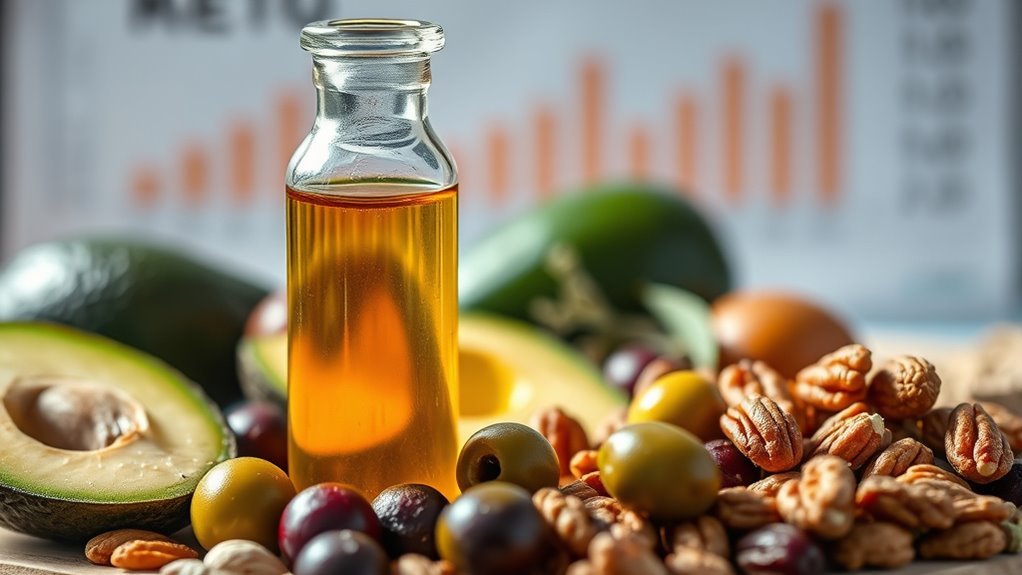The ketogenic diet can raise cholesterol levels, often increasing both LDL (bad) and HDL (good) cholesterol. This happens as your body adapts to burning fat for energy instead of carbs. While increased LDL may seem concerning, it’s vital to view this along with the rise in HDL, which benefits heart health. Individual responses can vary greatly, so monitoring your cholesterol levels is essential. You can explore more about managing cholesterol effectively while on keto.
Understanding Cholesterol: The Basics

While many people associate cholesterol solely with heart disease, it’s important to understand its role in the body. Cholesterol isn’t the villain it’s often made out to be; in fact, it plays essential functions, like aiding in hormone production and cell membrane integrity. You might have heard various cholesterol myths, like the idea that all cholesterol is bad. In reality, your body needs both low-density lipoprotein (LDL) and high-density lipoprotein (HDL) to maintain balance. LDL is often labeled the “bad” cholesterol, but it’s vital for transporting fats. Understanding cholesterol function can empower you to make informed dietary choices, allowing you to embrace a lifestyle that supports your health without unnecessary fear or restriction. Embrace the freedom that knowledge brings!
The Ketogenic Diet Explained

The ketogenic diet, often referred to as keto, is a high-fat, low-carbohydrate eating plan designed to shift your body’s metabolism from burning glucose to utilizing fat for fuel. Many people pursue keto for its potential ketogenic benefits, such as weight loss, increased energy, and improved mental clarity. However, there are common misconceptions surrounding this diet. Some worry that eating high-fat foods will lead to heart disease or elevated cholesterol levels, but research suggests that fat quality matters more than quantity. Emphasizing healthy fats, like avocados and nuts, can enhance the diet’s effectiveness while minimizing risks. By understanding the ketogenic diet, you can make informed choices that align with your health goals and lifestyle aspirations, allowing you to embrace your freedom in food choices.
How the Body Processes Fats on Keto

When you follow a ketogenic diet, your body shifts into ketosis, where it primarily burns fat for energy instead of carbohydrates. This process can greatly influence your cholesterol levels, depending on the types of dietary fats you consume. Understanding how your body metabolizes these fats is essential for optimizing your health on a keto diet.
Ketosis and Fat Metabolism
As you enter ketosis, your body undergoes a remarkable shift in how it processes fats for energy. This metabolic state promotes fat adaptation, enabling you to efficiently utilize fatty acids and ketones. The ketosis benefits include enhanced energy levels, improved mental clarity, and better appetite control.
To illustrate this process, consider the following table:
| Stage | Process | Result |
|---|---|---|
| Ketosis | Fat breakdown | Increased ketone production |
| Fat Adaptation | Body’s adjustment | Efficient fat usage |
| Energy Source | Shift from glucose | Sustained energy levels |
Impact on Cholesterol Levels
Shifting to a ketogenic diet not only alters how your body utilizes fats for energy but also influences cholesterol levels. Many people buy into cholesterol misconceptions, believing that high-fat diets invariably lead to high cholesterol. However, research shows that the body responds differently on keto. You may find your LDL cholesterol rise, but it’s vital to distinguish between the types of LDL particles. Keto myths often overlook the fact that increased HDL cholesterol, a protective factor, frequently accompanies these changes. Furthermore, the overall impact on heart health can be positive for many individuals. Understanding these nuances empowers you to make informed choices and embrace the potential benefits of a ketogenic lifestyle without unnecessary fear about cholesterol.
Types of Dietary Fats
Understanding the types of dietary fats is essential when starting on a ketogenic diet, as it directly impacts how your body processes these fats for energy. On keto, you’ll primarily rely on fats rather than carbohydrates, making the quality of fats significant. Monounsaturated fats, found in foods like avocados and olive oil, are beneficial for heart health and can aid in reducing inflammation. Polyunsaturated fats, including omega-3 and omega-6 fatty acids from sources like fish and flaxseeds, also play an important role in supporting overall health. Balancing these fats helps optimize your metabolism and maintain energy levels. By choosing the right types of fats, you can enjoy the freedom of a ketogenic lifestyle while still prioritizing your health.
Types of Cholesterol: HDL vs. LDL
Cholesterol plays an essential role in your body, but not all cholesterol is created equal. The two primary types are HDL (high-density lipoprotein) and LDL (low-density lipoprotein). Understanding their functions can empower you to make informed choices about your health.
| Cholesterol Type | Function |
|---|---|
| HDL | Transports cholesterol to the liver for removal |
| LDL | Delivers cholesterol to cells, but can lead to plaque buildup |
Cholesterol sources include animal products and certain oils, influencing both HDL and LDL levels. While HDL is often deemed “good” cholesterol, LDL has been linked to heart disease when elevated. Balancing these types is vital for maintaining ideal health.
The Impact of Saturated Fats on Cholesterol Levels
Dietary choices greatly influence cholesterol levels, particularly the consumption of saturated fats. Many people have cholesterol misconceptions, believing that all saturated fats are harmful. However, not all saturated fat sources have the same impact on your health. For instance, fats from coconut oil may raise HDL cholesterol (the “good” kind), while those from processed meats might elevate LDL cholesterol levels. It’s essential to recognize that individual responses to saturated fats can vary. You need to take into account the source and the overall quality of your diet. Emphasizing whole foods and healthy fats, like those from avocados and nuts, can help you maintain balanced cholesterol levels while enjoying the freedom of diverse dietary choices.
The Role of Weight Loss in Cholesterol Management
While many factors influence cholesterol levels, weight loss can play a significant role in managing them effectively. Losing excess weight offers multiple weight loss benefits, particularly in improving metabolic health. Studies show that even modest weight loss can lead to a decrease in LDL cholesterol and an increase in HDL cholesterol, enhancing overall cardiovascular health.
Here’s a breakdown of the key effects of weight loss on cholesterol:
| Weight Loss Benefits | Impact on Cholesterol |
|---|---|
| Reduces LDL cholesterol | Lowers heart disease risk |
| Increases HDL cholesterol | Improves cardiovascular health |
| Enhances insulin sensitivity | Supports metabolic functions |
| Reduces triglycerides | Aids in weight management |
| Promotes overall wellness | Encourages healthy habits |
Individual Variability: Genetics and Cholesterol
Understanding cholesterol isn’t solely about weight loss and lifestyle choices; genetics also plays a significant role in how your body manages cholesterol levels. Your genetic predisposition can influence how effectively your body processes fats, and conditions like familial hypercholesterolemia may result in abnormally high cholesterol levels regardless of diet. While lifestyle factors such as diet and exercise are important, they can’t completely override your genetic makeup. If you have metabolic syndrome, for instance, your cholesterol response to the keto diet may be different than someone without this condition. Recognizing these individual differences allows for a more tailored approach to cholesterol management, empowering you to take control of your health based on a thorough understanding of both genetic and lifestyle influences.
Studies on Keto and Cholesterol: What the Research Says
Although the ketogenic diet has gained popularity for weight loss and health benefits, its effects on cholesterol levels have led to mixed findings in research. Some studies suggest that while saturated fats may increase LDL cholesterol, they often also elevate HDL cholesterol, which is beneficial. This duality challenges common cholesterol misconceptions, highlighting that not all fat is harmful. Additionally, certain research indicates that individual responses to the keto diet can vary, debunking keto myths that apply universally. It’s important to approach the ketogenic diet with an understanding of these nuances. Embracing the freedom to explore how your body reacts can empower your dietary choices, especially when maneuvering through the complexities of cholesterol and fats in your diet.
Monitoring Your Cholesterol on a Ketogenic Diet
When you’re on a ketogenic diet, understanding your cholesterol levels is essential, as they can be influenced by the foods you eat. Regular testing helps you monitor changes and assess how your dietary choices impact your heart health. By staying informed, you can make adjustments to maintain ideal cholesterol levels while enjoying the benefits of keto.
Cholesterol Levels Explained
As you begin a ketogenic diet, it’s essential to monitor your cholesterol levels, since dietary fat intake can greatly impact your lipid profile. Many people hold cholesterol myths that suggest all fats are harmful, leading to dietary misconceptions. In reality, the type of fat you consume matters considerably. Saturated fats may raise LDL cholesterol, but they can also increase HDL cholesterol, which is beneficial. Regular monitoring allows you to understand how your body responds to increased fat intake. It’s important to differentiate between the various types of cholesterol—LDL, HDL, and triglycerides—when evaluating your overall heart health. By understanding these nuances, you can navigate your ketogenic journey with confidence, making informed choices that align with your health goals.
Foods Impacting Cholesterol
Understanding how different foods impact your cholesterol levels is essential for successfully monitoring your health on a ketogenic diet. Specific food sources can either promote or inhibit cholesterol absorption, affecting your overall levels. Here’s a quick guide to help you navigate your choices:
| Food Sources | Impact on Cholesterol Absorption |
|---|---|
| Avocados | May help lower LDL cholesterol |
| Fatty fish | Rich in omega-3s, supports heart health |
| Cheese | Can raise LDL but may have neutral effects in moderation |
Choosing the right food sources can empower you to enjoy the freedom of a ketogenic lifestyle while keeping your cholesterol in check. Stay informed, and make choices that align with your health goals.
Regular Testing Importance
Monitoring your cholesterol levels regularly can be a game changer while following a ketogenic diet. Cholesterol testing allows you to keep track of how your body responds to high-fat intake. While many individuals experience increased HDL (good cholesterol), some may see a rise in LDL (bad cholesterol), which can pose health risks. By engaging in consistent health monitoring, you can identify trends over time, adjust your diet proactively, and consult healthcare professionals if needed. This approach empowers you to make informed decisions about your health and dietary choices. Remember, not all cholesterol is equal; understanding your specific numbers is essential in steering your keto journey safely and effectively. Regular testing equips you with the knowledge to thrive on this lifestyle.
Tips for Maintaining Healthy Cholesterol on Keto
While starting a ketogenic diet can lead to weight loss and improved metabolic health, it’s important to keep an eye on cholesterol levels to guarantee overall cardiovascular well-being. To maintain healthy cholesterol on keto, focus on incorporating cholesterol-friendly foods like avocados, nuts, and seeds. These foods not only provide essential nutrients but also help balance your lipid profile. Opt for healthy fat sources, such as olive oil and fatty fish, instead of saturated fats found in processed meats. Regularly include fiber-rich vegetables, which can aid in cholesterol management. Staying hydrated and exercising can further support heart health. By making these mindful choices, you can enjoy the freedom of a keto lifestyle while maintaining a healthy cholesterol balance.
Frequently Asked Questions
1. Does a ketogenic diet raise cholesterol levels?
The ketogenic diet can affect cholesterol levels differently for each individual. Some people may experience an increase in total cholesterol, particularly LDL (low-density lipoprotein) cholesterol, often referred to as “bad” cholesterol. However, many studies have shown that this increase can be accompanied by an increase in HDL (high-density lipoprotein) cholesterol, which is considered “good” cholesterol. It’s important to monitor overall heart health and consult with a healthcare provider to interpret these changes accurately.
2. Why does keto potentially increase cholesterol levels?
A ketogenic diet is high in fats and low in carbohydrates, which can lead to changes in how the body metabolizes fat. When the body enters a state of ketosis, it burns fat for fuel instead of carbohydrates. This process can increase the production of cholesterol in the liver. Additionally, the types of fats consumed on a keto diet—such as saturated fats—can influence lipid profiles and potentially raise LDL cholesterol levels.
3. Can the increase in cholesterol from keto be harmful?
Not necessarily. While elevated LDL cholesterol is often associated with increased cardiovascular risk, it is crucial to consider the overall context. Some studies suggest that the quality of LDL particles is more important than the quantity. Smaller, denser LDL particles are more harmful than larger, fluffier particles. Regular monitoring, along with lifestyle factors such as exercise and diet quality, should be part of the assessment of cardiovascular risk.
4. How can I manage cholesterol levels while on a keto diet?
To manage cholesterol levels on a keto diet, focus on the type of fats you consume. Incorporate healthy fats such as avocados, nuts, seeds, and olive oil, while limiting saturated fats from sources like red meat and butter. Regular physical activity, maintaining a healthy weight, and including fiber-rich foods can also help manage cholesterol levels. It’s advisable to work with a healthcare professional to tailor dietary choices to your health needs.
5. Should I avoid the keto diet if I have high cholesterol?
Not necessarily. Although some individuals with high cholesterol may experience increases in their lipid levels while on a ketogenic diet, others may not. It’s essential to consider personal health circumstances, including family history and other risk factors for heart disease. Consulting with a healthcare provider before starting the keto diet can help determine if it is an appropriate choice based on your health profile and goals.
References
- https://www.ncbi.nlm.nih.gov/pmc/articles/PMC6520897/
- https://www.healthline.com/nutrition/keto-diet-and-cholesterol
- https://www.cdc.gov/cholesterol/index.htm
- https://www.heart.org/en/news/2021/02/09/keto-diet-may-increase-cholesterol-levels
- https://www.mayoclinic.org/healthy-lifestyle/nutrition-and-healthy-eating/expert-answers/keto-diet-and-cholesterol/faq-20467442
- https://www.webmd.com/diet/what-is-the-keto-diet
- https://www.verywellhealth.com/keto-diet-and-cholesterol-5195076
- https://www.hsph.harvard.edu/nutritionsource/keto-diet/


